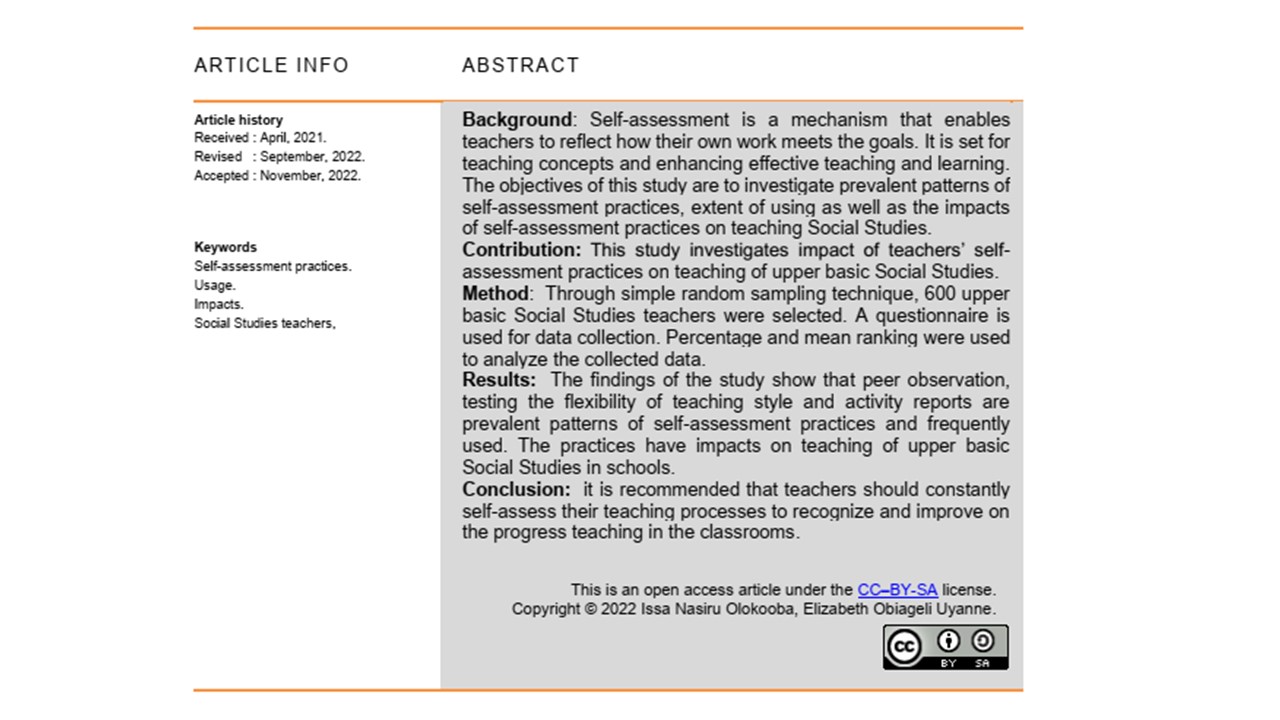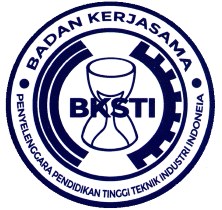Usage and Impact of Teachers Self-Assessment Practices on Teaching of Upper Basic Social Studies in Kwara State
DOI:
https://doi.org/10.12928/spekta.v3i2.4016Keywords:
Effective teaching, Impacts, Upper basic school teachers, Self-assessment practicesAbstract
Background: Self-assessment is a mechanism that enables teachers to reflect how their own work meets the goals. It is set for teaching concepts and enhancing effective teaching and learning. The objectives of this study are to investigate prevalent patterns of self-assessment practices, extent of using as well as the impacts of self-assessment practices on teaching Social Studies.
Contribution: This study investigates impact of teachers’ self-assessment practices on teaching of upper basic Social Studies.
Method: Through simple random sampling technique, 600 upper basic Social Studies teachers were selected. A questionnaire is used for data collection. Percentage and mean ranking were used to analyze the collected data.
Results: The findings of the study show that peer observation, testing the flexibility of teaching style and activity reports are prevalent patterns of self-assessment practices and frequently used. The practices have impacts on teaching of upper basic Social Studies in schools.
Conclusion: it is recommended that teachers should constantly self-assess their teaching processes to recognize and improve on the progress teaching in the classrooms.
References
I. N. Olokooba, “undergraduates’ self-assessment and learning of Social Studies in University of Ilorin, Ilorin, Nigeria” Journal of Evaluation, vol. 7, no. 1, pp. 189-200, 2022.
O. E. Abdullahi, “Principles of classroom evaluation” In A. A. Adegoke, et al. (Eds.) Introduction to teaching methodology. Ilorin: Faculty of Education, University of Ilorin, pp. 56, 2016.
D. Boud, & N. Falchikov, “What does research tell us about self-assessment?” London: Kogan. 2006.
K. Sambell, L. McDowell, L. & C. Montgomery, Assessment for Learning in Higher Education. Routledge: Oxon, 2013.
C. McKevitt, 2016). “Engaging Teachers with Self-Assessment and Tutor Feedback to Improve Performance and Support Assessment Capacity” Journal of University Teaching and Learning Practice, vol. 13, no. 1, pp. 2016.
H. O. Owolabi, “Evaluation in the Practice of teaching” In A. A. Adegoke, et al. (Eds.) Introduction to teaching methodology. Ilorin: Faculty of Education, University of Ilorin, 2016.
E. Gehringer, “Self-Assessment to Improve Learning and Evaluation” North Carolina State University, 2017.
H. Andrade & A. Valtcheva, “Promoting learning and achievement through self-assessment, Journal of Theory into Practice in Education, vol. 48, no. 1, 12-19, 2009.
E. Chalkia, “Self-assessment as an alternative method of assessing speaking skills in the sixth grade of a Greek state primary school classroom” Research papers in language teaching and learning, vol. 3, no. 1, pp 34-45, 2012.
E. Bellou, “Assessment of teacher performance: A factor that shapes the effectiveness of school’s educational work” Master’s thesis, University of Ioannina, Ioannina, Greece, 2017.
M. Zapitis, “The effects of self-evaluation training on writing of teachers in grades 5 & 6, Master’s thesis, University of Toronto, Toronto, Canada, 2011.
Z. Yan, “Teacher self-assessment practices: the role of gender, school level and goal orientation. Assessment in Education: Principles, Policy & Practice, vol. 25, no. 2, pp 183-199, 2018.
S. Sungur, & C. Tekkaya, “Effects of problem-based learning and traditional instruction on self-regulated learning. Journal of Educational Research, 99(5), 307-317, 2006.
J. O. Adetayo, “Classroom interaction patterns of part-time and full-time trained Social Studies teachers,” Nigerian Journal of Social Studies, vol. 14, no. 2, 28-46, 2011.
I. N. Olokooba, “Effective utilization of instructional materials for Social Studies in Upper Basic Schools in Kwara State. Anatolian Journal of Education, 6(1), 167-174, 2021.
D. A. Ariya, “Relative effects of concept-mapping instructional strategies on junior school students’ performance in social studies in Oke-Ogun, Nigeria,” An Unpublished Ph.D. Thesis, Department of Arts and Social Sciences Education, Faculty of Education, University of Ilorin, Ilorin, Nigeria, 2012.
J. H. McMillan & J. Hearn, J. “Student self-assessment: The key to stronger student motivation and higher achievement, Educational Horizons, 87(1), 40-49, 2008
A. Cobbinah & R. K. Annan-Brew, “Students’ perceptions of classroom feedback on teacher assessment practices in the Central Region of Ghana” Journal of Educational Research and Development, 7, 1, 1-10, 2019.
A. A. Abdulsalam, “Effects of guided-discovery and concept-mapping on Social Studies students’ performance in colleges of education in Kwara State, Nigeria,” Ph.D. dissertation, Department of Social Sciences Education, Faculty of Education, University of Ilorin, Ilorin. 2017.
I. N. Olokooba, & A. A. Abdulsalam, “Impacts of instructional evaluation techniques on teaching of upper basic Social Studies in Kwara State”, Journal of Educational Research and Development, 7, (1), 179 – 186, 2019.
I. N. Olokooba, & A. A. Abdulsalam, “Teacher variables and use of Computer Assisted Instructional Materials (CAIM) in upper basic Social Studies in Kwara State”, Nigeria Journal of Educational Technology 1, (2), 124-131, 2016.
Chen T, Crosbie RC, Anandkumarb A, Melville C, Nguyen N, Chen J. Conceptions of Learning and Teaching and Their Relation to Educational Variables During Teaching Second Language. SPEKTA (Jurnal Pengabdian Kepada Masyarakat: Teknologi dan Aplikasi). 2022 Jun 14;3(1):1-2.

Downloads
Published
How to Cite
Issue
Section
License
Copyright (c) 2022 OLOKOOBA ISSA NASIRU, Elizabeth Obiageli UYANNE

This work is licensed under a Creative Commons Attribution-ShareAlike 4.0 International License.
Authors who publish with SPEKTA (Jurnal Pengabdian Kepada Masyarakat: Teknologi dan Aplikasi) agree to the following terms:
- Authors retain copyright and grant the journal the right of first publication with the work simultaneously licensed under a Creative Commons Attribution License (CC BY-SA 4.0) that allows others to share the work with an acknowledgment of the work's authorship and initial publication in this journal.
- Authors are able to enter into separate, additional contractual arrangements for the non-exclusive distribution of the journal's published version of the work (e.g., post it to an institutional repository or publish it in a book), with an acknowledgment of its initial publication in this journal.
- Authors are permitted and encouraged to post their work online (e.g., in institutional repositories or on their website) prior to and during the submission process, as it can lead to productive exchanges, as well as earlier and greater citation of published work.

This work is licensed under a Creative Commons Attribution-ShareAlike 4.0 International License.












